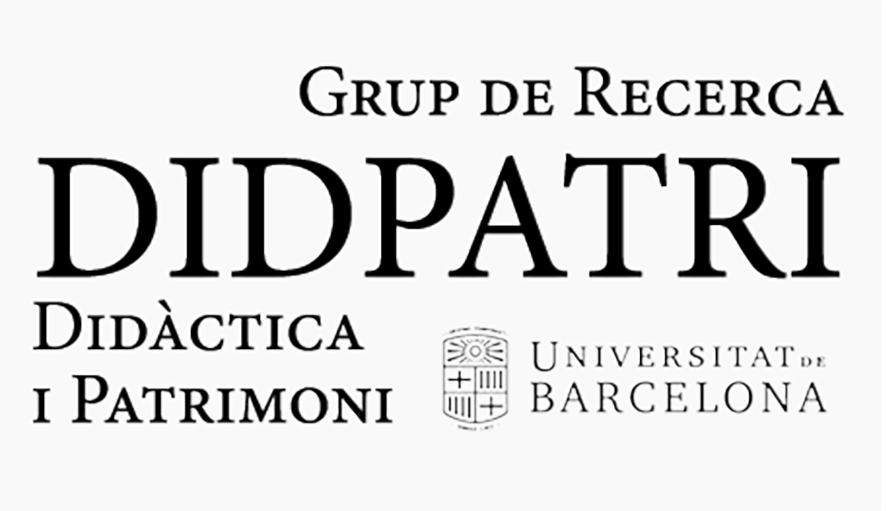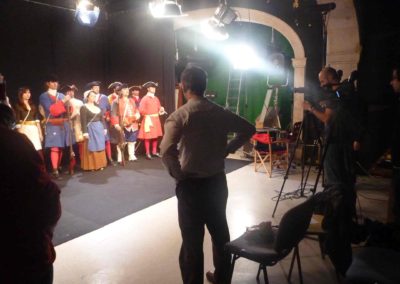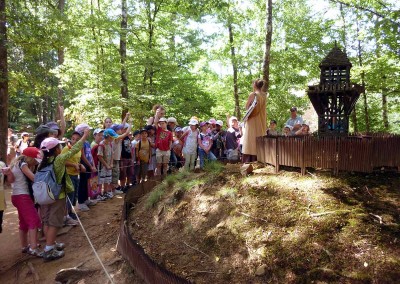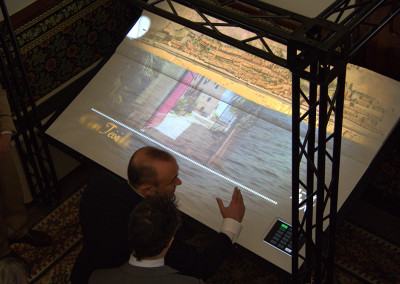Brief history of DIDPATRI
The research group DIDPATRI is based at the Department of Didactics on Social Sciences of the University of Barcelona. Its members have a long trajectory of research in the fields of education in Social Sciences and the Humanities both at the theoretical and at the practical levels. They have applied their research outcomes to a range of knowledge fields including History, Archaeology and Cultural Heritage for over 20 years.
DIDPATRI pioneered the development of museum studies through the proposal and analysis of new forms of public engagement. The group started its activity during the period 1995-1996 as part of the design team responsible of the Museum of the History of Catalonia (MHCAT) and the reconstruction of the Iberian Citadel of Calafell. During these years the group was formally created at the University of Barcelona and in 2005 it became a recognised research group within the government of Catalonia’s Support program SGR (2005SGR00621). DIDPATRI has continuously been distinguished with this award until now (2009SGR00245; 2014SGR945; 2017SGR550).
The researchers of the group have received funds for several basic research projects during the last 5 years such as:
- 2016 – 2019. “Iconografía y recreación histórica en la didáctica del patrimonio. El caso de la Guerra Civil Española” – The use of Iconography and historical reenactment on the dissemination of heritage. The case study of the Spanish Civil War. Educational Sciences program, Ministry of Economy and Competitiveness, Government of Spain, EDU2016-76589-R.
- 2016 – 2018. “Atapuerca-Evolución. Videojuegos educativos” – Atapuerca-Evolution: educational video games. BBVA Foundation program, PR (16)_HUM_I_0130.
- 2013 – 2015. “SimulPlay: Videojocs de simulació per l’aprenentatge tecnosocial” – SimulPlay: Simulation video games to promote technosocial learning. Recercaixa program. Fundació la Caixa.
- 2013 – 2015. “Desarrollo de estrategias y técnicas didácticas a partir del patrimonio y la arqueología del conflicto para la enseñanza/aprendizaje de las Ciencias Sociales y la Historia” – The development of techniques and strategies of didactics on heritage and conflict archaeology to promote learning of Social Sciences and History. Educational Sciences program, Ministry of Economy and Competitiveness, Government of Spain, EDU2012-35299.
The research outputs of the group have been published in several academic journals and also as monographs. The impact of DIDPATRI on the field of educational research and museum studies is highlighted by a volume of keynote speaks on academic conferences and the publication of handbooks on museums and interactive learning.
The group is interested on the spread of its outputs through the mentoring and training of new researchers, including the completion of 11 PhD dissertations and the funding of 3 predoctoral scholarships and 2 postdoctoral research contracts since 2014.
The basic research of the group is complemented by an intense activity of knowledge transfer under the label “Taller de Projectes: Patrimoni i Museologia” –
The projects workshop for Heritage and Museology (Bosch i Gimpera Foundation, Center for Innovation Les Cúpules, PRODEM program from the Spanish Ministry of Industry and Energy). During the last 15 years DIDPATRI has been involved on several international collaborations on museum and heritage studies (Spain, Italy and Northern Africa). These collaborations have been focused on the creation of prototypes generated by the group’s research with a significant emphasis on the use of pioneering digital technologies in education, outreach and impact.
The group is currently engaged on a knowledge transfer network between academia and SMEs including: Schola Didàctica Activa (education and edutainment); Molècula (museum exhibitions); SOT (digital archaeology and geophysics) and Rafael Dalmau Editor (publishing).
Brief description of the unit’s main research objectives
The main four objectives of DIDPATRI can be summarized as follows:
To research, test and develop innovative educational resources in the context of the Social Sciences and the Humanities
These resources should cover not only formal education but also non-formal learning strategies.
To achieve this goal the group identifies the needs of professional educators in the context of available resources. Existing methods are assessed using both quantitative and qualitative methods in an effort to detect potentials and issues. Once these requirements are defined then the community of educators is involved in the research and design of new learning methods and proofs-of-concept. DIDPATRI uses this approach to seek for the engagement of this collective as much as possible through the entire research process.
Museum studies are one of the main fields of study of the group. DIDPATRI explores the role that digital technologies can play in order to improve the presentation of cultural heritage both indoors (museums) and outdoors (heritage sites).In this context, researchers of the group critically assess and explore the benefits and challenges of using digital technologies as a main tool for outreach and knowledge dissemination.
To promote the use of educational games as a tool to understand past societies
Digital and board games are becoming one of the most powerful educational resource available to educators. Games can promote learning on a range of social and environmental topics including the understanding of the past, geography, social issues or climate change. However, their use presents several open challenges related to their use under formal education contexts.
The group is interested on creating breakthrough solutions to these issues in order to fulfil the potential of games as educational tools within the context of current school syllabus. These innovative approaches are focused on the creation of video games on the fringe between state-of-the art game development and pedagogical research as a means to develop new forms of interactive earning.
To encourage and support a knowledge transfer network linked to DIDPATRI’s research outputs
The group will actively seek to collaborate with a number of business partners with expertise in the field of culture and education. This transfer network currently uses diverse strategies including:
- Collaboration with companies willing to translate the group’s research prototypes into products ready for deployment. This includes a variety of outputs from new approaches to historical illustration to 3D modelling and interactive concepts.
- Integration of basic and applied research. DIDPATRI promotes the interaction between these 2 concepts by integrating researchers into the design teams of private partners as and promoting enriching debate.
- Creation of new resources in cooperation with SMEs not directly related to education as a means to strengthen the cultural sector of our economy. DIDPATRI actively seeks to engage private partners that can provide innovative solutions to challenges on the sector of education.






